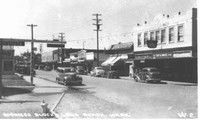Reading 100 Years of the Chinook Observer: His honor, the mayor
Published 5:00 pm Tuesday, August 6, 2002

- Downtown Long Beach as it appeared in the administration of Mayor George Buri.
At the end of the year in 1948, Long Beach Mayor George Buri wrote to his fellow councilmen, resigning his office. He was tired – he’d been a councilmember since 1938 and mayor since 1941 – he was getting along in years – he was 71 – and he wanted to go south for the winter.
Accordingly, he thanked his fellow council members for their “splendid co-operation” in the previous ten years of city governance, and prepared to leave. “I’m certain that Long Beach in its present progressive attitude and financial condition may well claim to be the most advanced and outstanding location on the entire Peninsula,” summarized the mayor. “Thank you, gentlemen, for duties well done.”
Buri’s fellow councilmen, however, would have none of it. They refused his resignation, gave him a two-month leave of absence, and looked hopefully toward that 61st day when he would return home.
Who was this mayor who was so regarded by city council members that they wouldn’t let him quit?
George J. Buri was born in Bavaria, Germany, in 1877; emigrated to the United States; served in the Spanish-American War; worked for the Union Pacific Railroad as an auditor; and retired to Long Beach in 1938. He was a member of nearly every organization in town – Kiwanis, the Elks, the Community Church, the Masons – and at some time or other had headed nearly every organization to which he belonged. He served as the auditor of the Port of Peninsula during the ’40s.
When Councilman Buri was promoted to the mayoralty in 1941, he inherited a city in debt in a nation that would soon be at war.
“In the city hall last Thursday evening, practically every business man in Long Beach was present at a special meeting of the town council to have a say in the discussion of raising city business licenses, as another measure to gain expense money which, as Mayor Buri told the group, must come if the town is to have increased and more modernized privileges.
“Most complaints … seemed to come through the act of upping the license at a time when normal business was falling off and to this the mayor and council were agreeable. But staring this fact in the face, Mayor Buri reminded, it was either raise the money or go back to dark streets, practically no policing, streets with filth in the gutters of main thoroughfares. If this is what you want gentlemen, then there is no further argument, said Buri.”
– June 12, 1942 The following week a new version of “the old out-moded town business license schedule” was approved. (A service station would now pay $20 per year; one with “light groceries,” $30; an amusement arcade, $15; a hotel dining room and bar, $50; each hotel room in use, $ .75; a drug store including fountain and light lunch, $25; the beer parlor, $50.)
By 1945 the town’s debt of almost $18,000 was reduced to zero and city put on a strictly cash basis. In the election that fall George Buri received 73 out of 76 votes cast for mayor.
“Editorial. Never let it be said Mayor Buri is allergic to shovel handles, for he was witnessed using a gravel shovel like a son-of-gun on Washington avenue craters Tuesday afternoon, following up a gravel truck. By Wednesday morning the avenue looked much improved, and now property owners will be relieved of car drivers resorting to [driving on] dwelling yards for right-of-way. A fine job, mayor, and long it shall be remembered that Geo. J. Buri really ‘scratched the gravel’ for Long Beach.”
– Feb. 1, 1946 During the 1940s, city hall dealt with
Traffic lights – “two vertical, hanging blinker lights to be placed at both north and south ends of the business district, which will caution drivers that they are entering a congested area”;
Unsatisfactory garbage service;
The need for another police officer – Long Beach’s population nearly doubled between 1940 and 1946;
New street lights – “Light by light, this city becomes brighter and brighter, six of the 20 new street lights being installed this week by the P. U. D. crew”;
The need for a “comfort station” (that euphemism which tiptoes around the need for public bathrooms in a town whose economy is built on tourism);
The looming question of a sewer system; and The conduct of the local marshal.
The last item was raised by Jim O’Connell, who “complained the marshall on one occasion was found asleep in the movie house.” A lady in the audience chimed in, “the marshal on one evening spent too much time dancing instead of policing.
“O’Connell informed that Mayor Buri fired … the best marshall this town ever had. And after hearing the complaints, Mayor Buri informed of his knowledge that [that marshal] was not the best marshal ever had here, and was let go owing to very just reasons; and furthermore, the mayor explained, he was not going to spend his nights down on the street riding herd on town marshals.
” ‘You fellows running night businesses on the street should know more about conduct of our marshals than I; policing this town is a hard job, and where are we going to get the so-called right kind of a marshal for $185 per month.’ In fact, said the mayor, ‘Jim, I’m going to appoint you as of now, police commissioner for the town of Long Beach. You will do the hiring and firing, and if you think you can create a better marshal than I, we will even raise the salary $10 or so, per month, in order to promote a fairer chance for better policing.'”
– March 7, 1947
“As of Monday evening, Aug. 2, Marshal Ted Blodgett’s resignation as city chief of police was accepted and to take effect Aug. 15 … Chief Blodgett’s salary has stood at $200.00 per month for service between 4 P.M. and midnight, seven days a week; and Blodgett, at the last council session, asked for a $50 per month raise and one day off each week. The mayor looked over the request and figured the demand was more than the city budget could stand … [but after further discussion] the mayor came back with the agreement that if the budget money can be found, go ahead and spend it.”
– Aug. 13, 1948
“Celebrants became too lively in town Tuesday night and eventually got their fists into the air, and picked a spot on the Tom Black dwelling porch for their fixing it, all to the displeasure of Mrs. Black who called on the law for assistance. The telephone central having little luck locating the law, called Mayor Buri who was sick in bed, and could think of only one way out, and that was blowing the siren. So the siren blew, and out came firemen from all directions who soon, in none too good humor, put the town back on a peaceful basis in short order.”
– Sept. 24, 1948
“In council session here Monday evening, Mayor Buri said he’s ready for action against motor speedsters on city streets and is willing to split fines with any person who is willing to take the job of running down traffic violators.
“Irwin Doak of this city brought up the matter of speeding cars having a wide open field in Long Beach and advised that sooner or later some innocent person will be killed if some measure of correction is not taken. At once Mayor Buri tried to hire Doak for the job and informed that he would be rejoiced to get some fellow who would make a fulltime job of running down these speeding motorists.
“Councilman Ted Lentz was mutual in regard to correction of unnecessary speeding through town but did not feel the town should establish a trap. The mayor did not seem to worry over what means were used, so long as a stop was put to the speeding. He told his listeners, speed traps have never created any ill will for Elma, or any other town he knew of. In fact, Buri said, he respects Elma much more since being picked up there for over speed.”
– Nov. 19, 1948
“Wn. Ave. Women Descend Upon City Fathers. Set to Demand Dust Coats; Dads Lead Way,” read the headline the next summer. Washington Avenue in those days was not paved – many city streets weren’t. Standard treatment called for putting a coat of oil on the roadway to hold down the dust. Anyone who’s ever lived on a dirt road and tried to keep a clean house knows the problem.
“Monday night’s council session here may have well been the opening of a stork shower, judging by the number of women gracing the council chambers, all set to dust-bowl city pappies if they refused to take action against Washington avenue dust. ‘The boys behind the guns,’ however, were apparently fore-warned, for hardly before the minutes were read, the body hurriedly got into street committee action, and without the flicker of a lash, Mayor Buri announced a gigantic ‘dust coat’ program for city streets including Washington avenue, a part of Idaho avenue, and all side streets from 10th S. to 10th N.”
– June 10, 1949 Knowing when he was bested, having a lively sense of humor, down to earth, clear spoken, creative, hardworking – George J. Buri was just about the perfect public servant. There should be a monument to him in city park.






